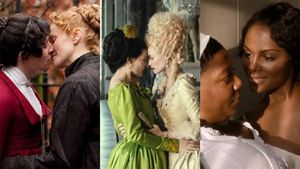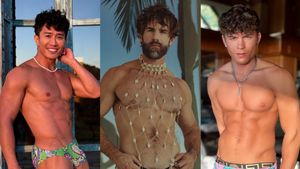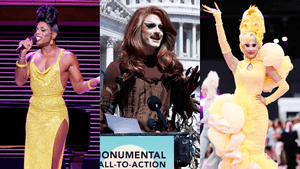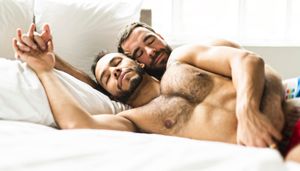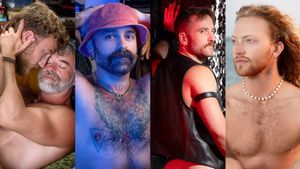Wednesday
morning, I awoke red with anger and blue with sadness even
as tears of joy had graced my face for progress the
night before.
This week, voters
across the nation affirmed a promise that was
launched from Middle America. Barack Obama, half black, half
white, raised by grandparents who hailed from the
heartland, became the president-elect of a country
beleaguered by partisan, socioeconomic, and racial
divisions that have haunted our nation for decades and
escalated to a crescendo in the last eight years.
"If there
is anyone out there who still doubts that America is a place
where all things are possible," President-elect Obama
told a rapt crowd in Chicago's Grant Park,
"who still wonders if the dream of our founders
is alive in our time, who still questions the power of our
democracy, tonight is your answer."
Yet even as one
prejudice fell to the will of the people on Election Day,
LGBT Americans awoke the next morning to reports from the
West to the South that all but confirmed one thing: We
are most certainly second-class citizens in our own
country. Even the voters of California -- a state that
legislatively approved same-sex marriage rights twice and
judicially issued the single most gay-affirming court ruling
to date -- appear to have concluded that gay and
lesbian partners don't deserve the equal right
to commit their love to each other. While I do not agree
with the notion that I am undeserving of the same
rights provided to other citizens by the Constitution,
I cannot escape the reality that a majority of my
fellow citizens still feel exactly that way. So perhaps
it is time to reevaluate our movement's
approach with an eye to the area of our country that
just supplied us with the single biggest civil rights
advancement in a century.
Midwesterners are
a practical people. They don't have that feel-good
"it's all about the journey" vibe of
West Coasters, nor do they possess the soothing
subtleties of Southerners, and they're a tad shy of
the bottom-line brashness of Northeasterners. Function
is more important than form to a Midwesterner, but
they value the ethos of hard work, decency, and
fairness above all else.
So when out
Illinois state representative Greg Harris introduced a
marriage bill in February 2007 and then realized he
didn't have the votes to pass it, he
didn't rest on his laurels. Instead, he turned around
and introduced a civil unions bill that same month.
Why? "We knew it was going to take a few years
to pass marriage, and real people need real
protections today," says Rick Garcia of Equality
Illinois. They also wanted to capitalize immediately
on the commitments of state legislators who had
rejected marriage but privately pledged their support for a
lesser union.
Not surprisingly,
our new president's approach to LGBT concerns largely
mirrors the Illinois gay community's practical
handling of them. When I interviewed Senator Obama in
April 2008 and pushed him on his lack of support for
full marriage protections, he indicated that his position
was informed by what he thought was strategically
possible at this moment in time.
"I'm the product of a mixed marriage that
would have been illegal in 12 states when I was
born," he said. "That doesn't mean that
had I been an adviser to Dr. King back then, I would
have told him to lead with repealing an
anti-miscegenation law, because it just might not have been
the best strategy in terms of moving broader equality
forward."
When I nudged him
further by suggesting that the LGBT community was
looking for leadership in the vein of John F. Kennedy, who
was the first white national political figure to frame
racism as a moral question for the country, Senator
Obama answered, "But he didn't overturn
anti-miscegenation. Right?" Point taken. Instead of
pushing a federal mandate to repeal the ban on
interracial marriages that still existed in many
states, President Kennedy introduced a basic civil rights
bill in 1963.
The success of
the LGBT movement in Illinois also parallels in some ways
the steps of Barack Obama's rise to power in that
state. Sure, his political career originated from the
urban center of Chicago. But when he launched his
statewide bid for the U.S. Senate, his immediate support
from downstate politicians representing predominately white
areas was striking. "I saw all these Caucasian
state senators stepping up and endorsing him right out
of the box. These are not people who are used to
taking political risks," says gay activist Art
Johnston, a founder of Equality Illinois and president
of its board.
Similarly,
Representative Harris told me that even though his marriage
bill lacked traction, he was genuinely surprised by the open
dialogue he had with members from the more
conservative southern part of the state.
"People understood," he says. "They
said, 'Is there something short of marriage
that will give people their rights?'"
Even as
California's marriage battle drags on and New York
and New Jersey are poised to advance their marital
quests legislatively, I am reminded of how many states
and how many people exist somewhere in between the
passions of America's coasts. Ultimately, I
don't think our movement should settle for
anything less than full equality, and that includes
marriage rights. But as a Midwesterner by birth who has
lived six years in South Carolina, five in San
Francisco, and now four in New York, I still find
wisdom in the center -- where a confluence of interests,
customs, and differing points of view bleed into each other
to yield a softer palette.
Just as our
country pushes forward to form a more perfect union, so
should we. But let us not deify marriage to the exclusion of
pursuits like employment nondiscrimination, hate-crime
protections, and basic partnership recognition.
Perhaps we can embrace the lessons of history -- and
even smile in the knowledge that the path to freedom is
not always straight.







































